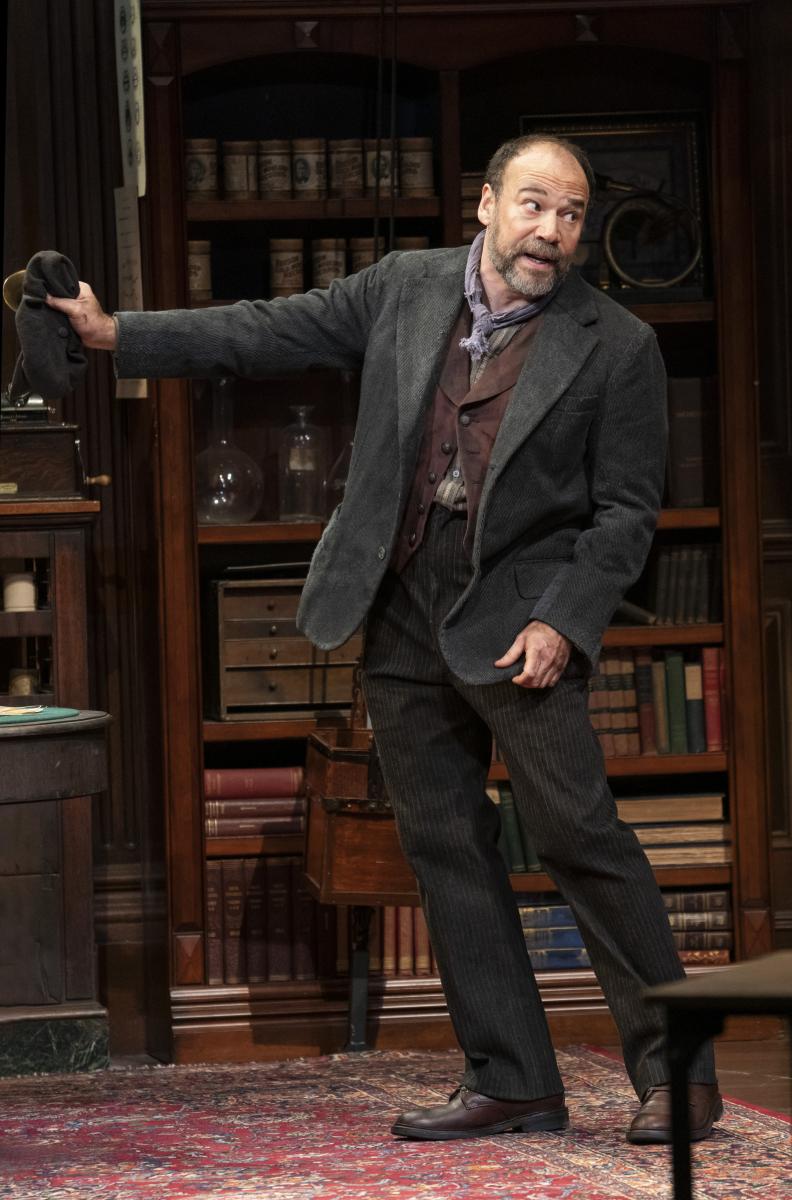Review: Laura Benanti Brings Fresh Maturity to Eliza in Bartlett Sher's Glorious MY FAIR LADY Revival
|
Flying in the face of the dreadful 21st Century practice of making extreme cuts and revisions to classic musicals by deceased authors in the belief that they would offend contemporary sensibilities if presented as originally written, director Bartlett Sher has spent a good part of the last two decades mounting elegant and thoughtful revivals that smooth over potential trouble spots by, believe it or not, doing what directors are assigned to do... interpret and direct.

So, with just a minimal number of edits, Sher's magnificent revivals of SOUTH PACIFIC, THE KING AND I, FIDDLER ON THE ROOF and his current offering of My Fair Lady, have allowed authors' words from the past to speak for themselves while the action is observed though a contemporary lens.
For My Fair Lady, Alan Jay Lerner and Frederick Loewe's just about perfect musical comedy creation based on George Bernard Shaw's social commentary, PYGMALION, where Edwardian phonetics expert Henry Higgins bets his colleague Colonel Pickering that, by teaching working class Eliza Doolittle proper manners and exquisite English pronunciation, he can pass her off as royalty to his peers at the Embassy Ball, that means that when this production opened in April of last year, what stood out was the care taken to show that Eliza is an intelligent and savvy woman who is focused on improving herself in order to secure a better future.
Lauren Ambrose gave an excellent performance as this production's original Eliza, and now seasoned musical theatre veteran and Tony winner Laura Benanti guides the role into a compelling new direction with her fascinating interpretation.
Though this reviewer certainly hasn't seen every Eliza Doolittle that has trod Broadway boards since young Julie Andrews essayed the role's musical version in 1956, it's unlikely that New York has previously seen a flower girl who is so much a mature lady at the musical's outset. Like CHICAGO's Roxie Hart and Velma Kelly, Benanti's Eliza has come to realize that she's grown past the point where she can get by on her girlish appeal and requires a new direction in life as she approaches middle age.
Carrying herself with great poise, even when her broad cockney accent identifies her lack of refinement, this is an Eliza who, like that of her predecessor, is quite believable as someone who has already acquired a certain degree of sophistication, She just lacks the proper skills with which to voice it.
Her handling of the Shaw/Lerner verbal wit is superb and there's a heartbreaking reaction where she reveals her disappointment with herself for what she sees as a moment of failure.
And then there's that singing voice; a rich and warm soprano that matches the near-operetta quality of Loewe's compositions, teamed with impeccable phrasing and expression. This is a musical theatre master in a role that is worthy of her capabilities.
Harry Hadden-Paton continues to do a terrific job as Professor Henry Higgins, even singing out a bit more than when this production opened. Lacking the smugness that often accompanies the role, this is a softer version of the fellow, so enraptured with the manner in which people communicate that he's clueless about how they feel.
The character's insistence that he's a good person because he treats everyone the same is a key element to viewing him in contemporary terms. Living in cloistered privilege he's completely oblivious to the kind of treatment by men the Eliza is accustomed to, so in moments of friction when she expresses her expectation that he's about to hit her, he seems truly shocked, with his feelings genuinely wounded at the thought that someone would consider him capable of such a thing.
With Benanti's more mature characterization to counter, it becomes more apparent that this Higgins is turning Eliza into a replica of his mother, now being grandly played by Rosemary Harris. As he expresses in the second act, he likes Eliza more the more she calls him out for his rudeness, something that his mother continually does. The difference though is that while Mrs. Higgins feels a parental obligation to maintain a relationship with her son, Eliza rejects him in a thrillingly acted scene where they hash out what their relationship has become.

(Photo: Joan Marcus)
Another newcomer to the production is Danny Burstein as Eliza's father, the boisterous dustman Alfred P. Doolittle. Unlike his predecessor, Norbert Leo Butz, Burstein is less of a barroom philosopher and plays the role in its traditional music hall vein. But the fun of his comic performance is put on hold for a brief moment when he sees that his newly genteel daughter is being accompanied back to her old neighborhood by Freddy Eynsford-Hill, who is played by African-American actor Christian Dante White. The cold stare Burstein's Doolittle gives the black man standing next to his daughter strongly suggests racist animosity.
White's showcase moment as Freddy, of course, is his beautiful performance of "On The Street Where You Live," sung with a lovely baritone and played with the kind of giddy enthusiasm you might expect from an instantly infatuated fellow with little experience at romance.
Aside from Hadden-Paton's Higgins, the strong performances of Linda Mugleston's thickly-brogued Mrs. Pearce and Allan Corduner's charming Colonel Pickering remain from the original company of this glorious revival.
Add Your Comment
Videos

